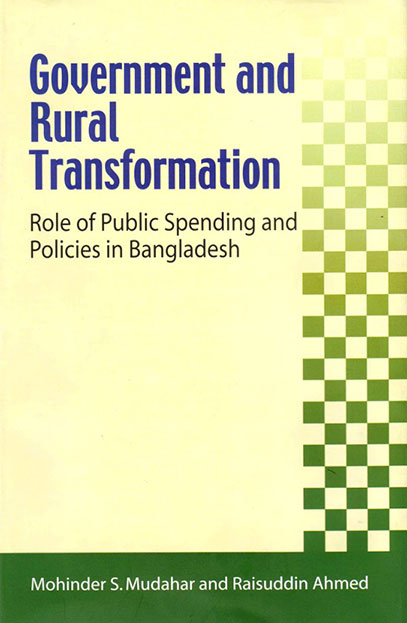
- Shop
- Development
- Government and Rural Transformation: Role of Public Spending and Policies in Bangladesh
Government and Rural Transformation: Role of Public Spending and Policies in Bangladesh
https://uplbooks.com/shop/9789848815137-government-and-rural-transformation-role-of-public-spending-and-policies-in-bangladesh-8293 https://uplbooks.com/web/image/product.template/8293/image_1920?unique=3d813f3
| Language: English |
Tags :
Book Info
The book depicts an analytical picture of the socio-economic transformation of the economy of Bangladesh, particularly of the agriculture and rural sectors. Transformation is explained as improved conditions of life and living, through expanded access to income, health, education, energy, transportation services and protection against vulnerability. Public expenditure and policies to support the development of infrastructure, technology, institutions, private initiatives of collective organizations, including NGOs, and numerous individual ventures contributed to the transformation. While a large number of causal factors underlying the transformation are recognized, the synergy of all factors constitutes the basic source of success. This synergy reinforces impacts of one another and induces the growth of new innovative activities. The past twenty-five years provide the canvas for the depiction of transformation presented in the book. Based on lessons of the past and the emerging global scene, and of the rural economy of Bangladesh- a vision for the future two decades of economic development is portrayed. Challenges to the realization of the vision are underlined and an agenda of public actions to be taken is outlined. In an extremely dynamic world, Bangladesh has to remain constantly alert to changing events in domestic, regional and global contexts. Development of internal capacities for analysis, design and implementation of socio-economic programmes is thus a crucial requirement. The book is destined to become an essential handbook on the agricultural economy of Bangladesh.

Raisuddin Ahmed
Raisuddin Ahmed is currently an Emeritus Research Fellow at the International Food Policy Research Institute (IFPRI), Washington DC, USA. He has served at IFPRI for 25 years and was the Director of the Markets and Structural Studies division of the Institute before becoming an Emeritus Research Fellow in 2001. Prior to his service at IFPRI, he worked at the Planning Commission and the Ministry of Agriculture of the Government of Bangladesh. At IFPRI, he conducted research on agricultural production, trade, marketing and pricing policies in Asia and Africa. He has also studied the effects of infrastructure and technological policies on agricultural productivity, rural employment, and rural income distribution. Dr. Ahmed has published many journal articles, research reports, and books. Among

Mohinder S. Mudahar
Dr. Mohinder S. Mudahar is currently an International Consultant with the World Bank, Washington, D.C., where he was formerly a Country Manager. His last assignment was as Economic Advisor in the World Bank Country Office in Bangladesh. he has also worked in the International Fertilizer Development Center and taught at Cornell University, USA. He obtained an M.Sc. degree in agricultural economics from the Punjab Agricultural University, India; and an MS and PhD degrees in economics from the University of Wisconsin, Madison, USA. He has published several monographs, journal articles and papers dealing with agriculture and rural development in South Asia, Central Asia, East Asia, Africa and countries in the former Soviet Union.


